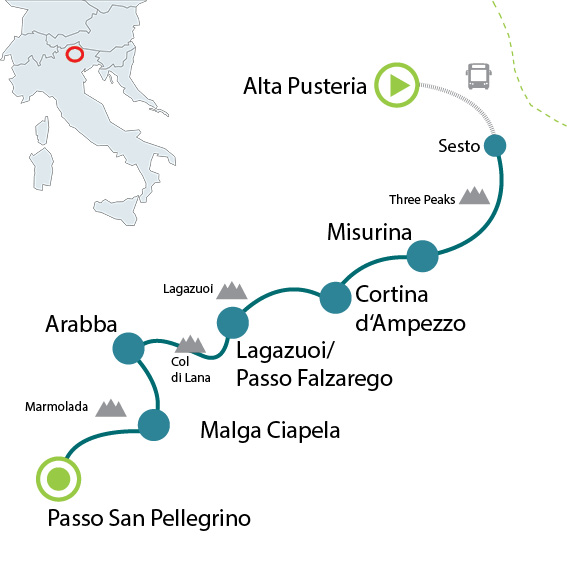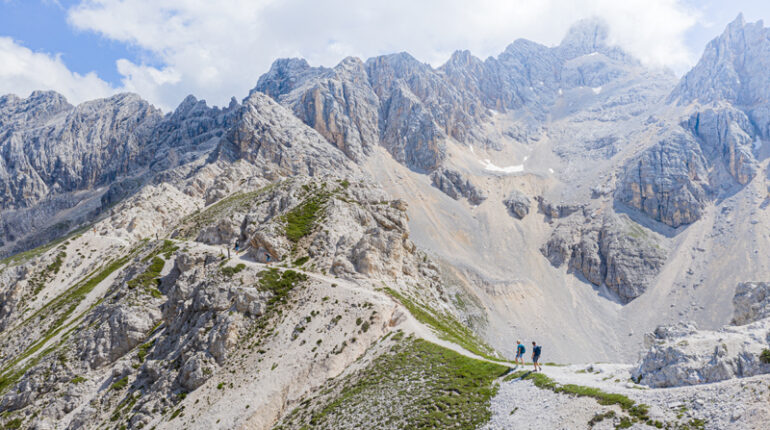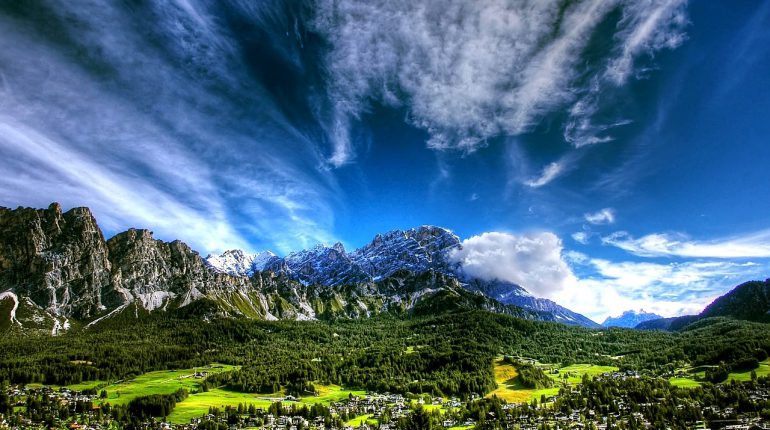
The Dolomite front has left deep tracks: fortresses, bunker and funk holes are silent witnesses to one of the darkest chapters in human history. The First World War also raged in the Dolomites, in the midst of these majestic mountains and breathtaking nature. This hiking tour aims to commemorate the hard-earned and fragile peace in a united Europe leading you through a unique landscape, the same one where thousands of Austrian and Italian mountaineers found their death in a hail of bullest and even more because of cold and avalanches.
The hike runs along well-marked mountain and hiking trails. The tour is suitable for everyone with a good basic condition. Most of the stages can also be shortened using public buses and cable cars.
Passionate hikers and nature lovers will, as well as those who are interested in history will find here full satisfaction.
Included and Not Included Services
Accommodation in inns and hotels 3*** category, partly huts
Breakfast buffet or full breakfast
Personal tour information
Luggage transfer from hotel to hotel
Transfers according to the program
Back transfer to Hochpustertal/Alta Pusteria at the end of the tour
Well planned routes
Detailed documents (maps, route description, places to visit, important telephone numbers)
Navigation APP
Telephone service hotline for the entire tour
Arrival to the starting point of the tour
Departure at the end of the tour
Drinks, tourist tax and all extras
Lunch, Dinner
Tickets for bus and cable car
Not mentioned entries
Travel insurance
All not expressly mentioned under the item „Included services"
Day 1: Alta Pusteria/Hochpustertal (Villabassa/Niederdorf or Dobbiaco/Toblach)
Individual arrival at the hotel in Villabassa/Niederdorf or Dobbiaco/Toblach. Free, ungarded public car park near the hotel.
Day 2
(ascent approx. 1.060 m, descent approx. 760 m / approx. 6-7 hours)
A transfer will bring you to the starting point of your hiking tour into the Valley Fischlein in Sesto/Sexten. From here you hike under the Paternkofel, which was fought over in the First World War (the legendary mountain guide Sepp Innerkofler lost his life here) in direciton of the landmark of the Dolomites, the Three Peaks - part of the UNESCO World Nature heritage. Monte Piano is located above the stage town of Misurina, the northern summit of which was occupied by the Austrians and the southern summit by the Italians. Nowadays an open-air museum about the First World War is there.
Day 3: Misurina - Cortina d'Ampezzo
(ascent approx. 580 m, descent approx. 1.110 m / approx. 6-7 hours)
At the foot of the Cristallo group, over 3.000m high, the route leads over Tre Croci Pass to Cortina d’Ampezzo, which was only assigned to the Italian kingdom after the defeat of the Habsburg Monarchy in 1918. Only 38 years later, winter athleetes coming from from several Nations were to fight for Olimpic medals here. In 2026, Cortina and Milan will once again host the Winter Games.
Day 4: Cortina d‘Ampezzo – Lagazuoi/Passo Falzarego
(ascent approx. 1.350 m, descent approx. 480 m / approx. 5-6 hours)
The day starts with a hiking to Col Drusciè. Below the well-known rock formation of the famous Tofana you climb up towards the summit of the Lagazuoi. During the First World War, soldiers dug tunnels and trenches into the rock walls and turned the mountain into a veritable fortress. Today you can visit the restored tunnels, trenches and artillery positions in the open-air museum on the Lagazuoi and relive the war. There is even an approx. 1 km long accessible tunnel that leads into the valley inside the mountain. From the summit of the Lagazuoi is also a cable car leading directly to the Falzarego Pass in case you wish to shorten the stage.
Day 5: Lagazuoi/Passo Falzarego – Arabba
(ascent approx. 930 m, descent approx. 1.090 m / approx. 7-7,5 hours)
Shortly after the start of the stage, you will pass the proud Buchenstein Castle (Castello di Andraz) at 1,730 m, built on a rock shortly after the year 1000. There is now a museum that is well worth seeing. After this short excursion into the Middle Ages, you can now retrace the footsteps of the First World War and climb the Col di Lana and Monte Sief. The former achieved particularly notoriety and would go down in history as the „mountain of blood“. The Italians, who could not take the summit, began to dig tunnels under the mountain in order to finally blow up the summit occupied by Austrian soldiers. Part of the route can be shortened by bus.
Day 6: Arabba – Malga Ciapela
(ascent approx. 760 m, descent approx. 900 m / approx. 4-5 hours)
Starting from Arabba, the route initially leads steadly uphill to Passo Padon, from where you have an unforgettable view of the Marmolata glacier. This was also a frontline area in the First World War and was expanded by the Austrians into the so-called „Ice City“. Several kilometers of corridors and rooms were cut deep into the ice. This is followed by the descent to the Fedaia reservoir at the pass of the same name. The end of the stage is the Malga Ciapela fraction, from where also a cable car goes up to the “Museo Marmolada Grande Guerra” at 3000 m. Daily life in the barracks and trenches and the fight against snow and ice are impressively remembered there.
Day 7: Malga Ciapela – Passo San Pellegrino
(ascent approx. 1.040 m, descent approx. 690 m / approx. 5.5-6 hours)
Past the managed Alm Malga Ciapela, where home-made products are offered for sale, you hike through the Valle Franzedas to the highest point of the stage at the Passo di Forca Rossa, which as a strategic point and connecting route to Passo San Pellegrino already in the first days of the war was occupied by the Italians. From here it goes comfortably downhill past the Rifugio Fuciade at the foot of the Costabella mountain range to Passo San Pellegrino - the best opportunity to end the hiking tour comfortably with typical dishes in the middle of the pasture areas.
Day 8: Transfer to Alta Pusteria/Hochpustertal + departure
In the morning transfer to Alta Pusteria/Hochpustertal/; individual departure or possibility to extend your stay.
By car: on the motorway Brenner/Brennero (A22) to Brixen/Bressanone – take the exit “Brixen-Pustertal”, then along the valley Pustertal/Valle Pusteria (SS49) to Villabassa/Niederdorf or Toblach/Dobbiaco. Or drive along the Felbertauernstraße to Lienz in Eastern Tyrol (Austria) and then further into Italy through the valley Pustertal/Valle Pusteria to Toblach/Dobbiaco or Villabassa/Niederdorf.
By train: take the train from Innsbruck over the Brenner/Brennero to Franzensfeste/Fortezza. Change train for the Pustertal/Valle Pusteria - Lienz and get off at Villabassa/Niederdorf orToblach/Dobbiaco. Timetable available on: www.deutschebahn.de, www.oebb.at, www.trenitalia.com.
By plane: Low cost flights are available to Innsbruck airport, „Sant’ Angelo - Antonio Canova“ airport in Trevisoand/or to the „Marco Polo“ airport in Venice. On request, we can organise transfers from the airport to the starting point of the cycle tour.
Inns and hotels 3*** category, partly huts
Attention: Tourist tax – if requested – has to be paid on the spot!
Free and unguarded parking facilities for the duration of the hiking tour at a nearby public parking area.
We suggest travel insurance.
You might also be interested in

Quotation
Send RequestUnfortunately, this tour is currently unavailable. However, we welcome you to submit an individual request.
Tour information
- Duration 8 days
- Minimum age 14 years and older
- Difficulty Level Easy
- Distance 88 - 90 km













